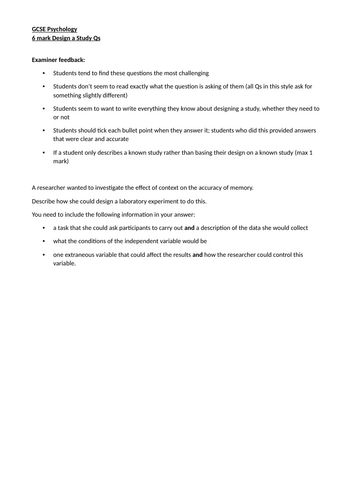
207Uploads
22k+Views
594Downloads
All resources

PSHE - What is Sexual Harassment / Unwanted Sexual Attention? Lesson plan
What is Sexual Harassment / Unwanted Sexual Attention? Lesson plan which has an overview of what what sexual harassment and unwanted sexual attention are, recognize the forms these behaviours can take, and know how to respond appropriately to such situations. Students will also be introduced to

Role Play - Client Centered Therapy (The Humanistic Approach) for A-Level Psychology AS/A2
A word document with clear instructions to carry out a role-play task on client-centred therapy in the humanistic approach with your A-Level Psychology students.
Objective:
To practice the principles of client-centered therapy by role-playing a session between a therapist and a client. The focus is on creating a supportive environment that encourages self-exploration and personal growth.
Instructions:
Divide into pairs:
• One person will act as the therapist, and the other as the client.
• After one session, switch roles so both people get to experience being the therapist and the client.
MORE INFORMATION ON THE SHEET

Role Play - Anger Management for offending behaviour (Forensic Psychology) for A-Level Psychology A2
A word document with clear instructions to carry out a role-play task on anger maangement for offending behaviour (in forensic psychology) with your A-Level Psychology students.
Objective:
Students will participate in a role-play exercise simulating the three stages of anger management therapy used to address offending behaviour: Cognitive Preparation, Skills Acquisition, and Application Practice. The goal is to help students understand how these stages help offenders manage anger and reduce the likelihood of aggressive behaviour.
Instructions:
Divide into Groups of Three:
Each group will have three roles:
• Therapist: The person facilitating the anger management session.
• Client/Offender: The individual who is undergoing anger management.
Observer/Someone who the client can be angry with during role-play: The person who takes notes on how the therapist and client apply the stages
MORE INFORMATION ON THE SHEET

The teacher’s guide to self-care
The teacher’s guide to self-care
Build resilience, avoid burnout, and bring a happier and healthier you to the classroom

Templates for essay plans - 16 markers in A-Level Psychology
Templates for essay plans - 16 markers in A-Level Psychology that can be adapted for any topic/essay title

Psychology Subject Specific Terminology
List of key words and definitions - can be used for revision etc

Anti-discriminatory practice - HSC/PSHE
The aim of this task is to understand how national initiatives promote anti-discriminatory practice.
Attached is a table of key legislation concerning discrimination against people along with other questions.

True/False questions/quiz for the memory topic in GCSE Psychology AQA -WITH ANSWERS
Fun quiz - can be set as a starter/plenary/test/HW. Can take out some questions if you want to adapt for A-Level. Answers at the end of the document.

AQA A-Level Psychology Scheme of Work for Research Methods
AQA A-Level Psychology Scheme of Work for Research Methods topic

AQA A Level Psychology curriculum map for year 12 and 13
AQA A Level Psychology curriculum plan for year 12 and 13

GCSE Psychology Research Methods Exam Questions
GCSE Psychology
6 mark Design a Study Qs
Can be set as assessment/classwork/homework

Instructions for conducting a memory experiment in Psychology
Instructions for conducting a memory experiment in Psychology

100 Cheat Codes/Success Codes for students studying AQA A-Level Psychology
Here’s a comprehensive list of 100 Cheat Codes/Success Codes for students aiming for an A* in AQA A-Level Psychology, specifically aligned with the AQA A-Level Psychology specification. These tips are based on exam feedback, specialist commentary, and proven strategies to help students understand key concepts, optimize their study time, and approach the exam with confidence. These codes are designed to help you master the material and get ahead in your preparation.

Research Methods Quiz / Quizzes for A-Level Psychology (FUN)
Some short quizzes and games to test AS and A2 research methods for AQA A-Level Psychology. These activities will engage students and help reinforce key concepts in a fun, interactive way.

Role Play Task: Cognitive Behavioural Therapy (CBT) for A-Level Psychology (Approaches Section - AQA
Role Play Task: Cognitive Behavioural Therapy (CBT) for A-Level Psychology
(Approaches Section - AQA) - But can be used for any exam board and GCSE
Objective:
Students will engage in a role-play exercise to simulate a CBT session, focusing on how this approach is used to help individuals challenge and reframe negative thoughts and behaviours. This will help students understand the cognitive approach to treating mental health issues.
Instructions:
Divide into Pairs or Small Groups:
Each group will consist of two roles:
• Therapist: The person guiding the CBT session.
• Client: The individual seeking help to challenge their negative thoughts and behaviours.
MORE INFO ON SHEET

Effective ways to scaffold for students - CPD / PD for staff
Effective ways to scaffold for students - CPD / PD for staff

Effective Ways for Teaching to Check for Understanding (CPD Session for Staff)
In any classroom, it is essential that teachers continuously assess whether students are grasping the content being taught. Checking for understanding ensures that learning is happening and helps identify any gaps early on. Here are some effective strategies to check for understanding, which can be used across different subjects and grade levels.




















